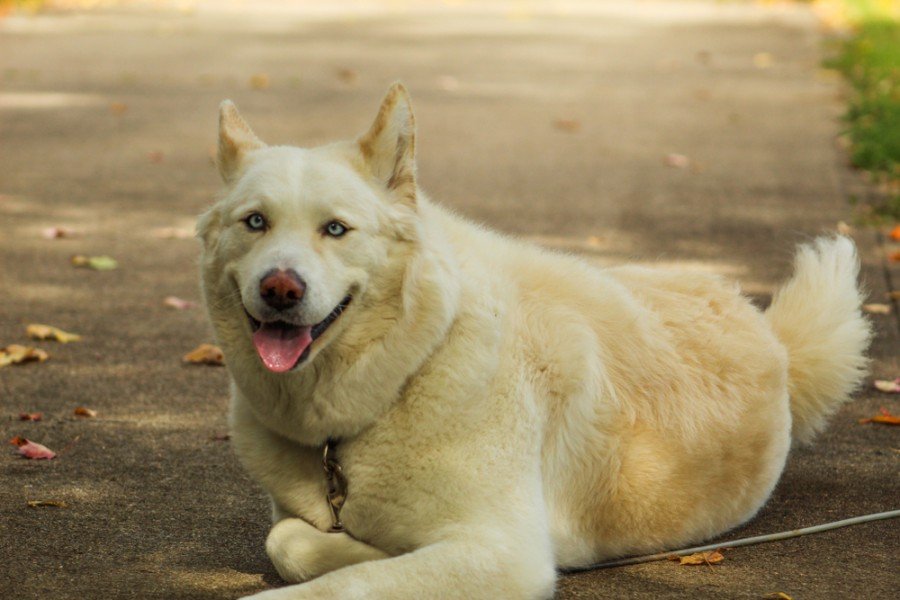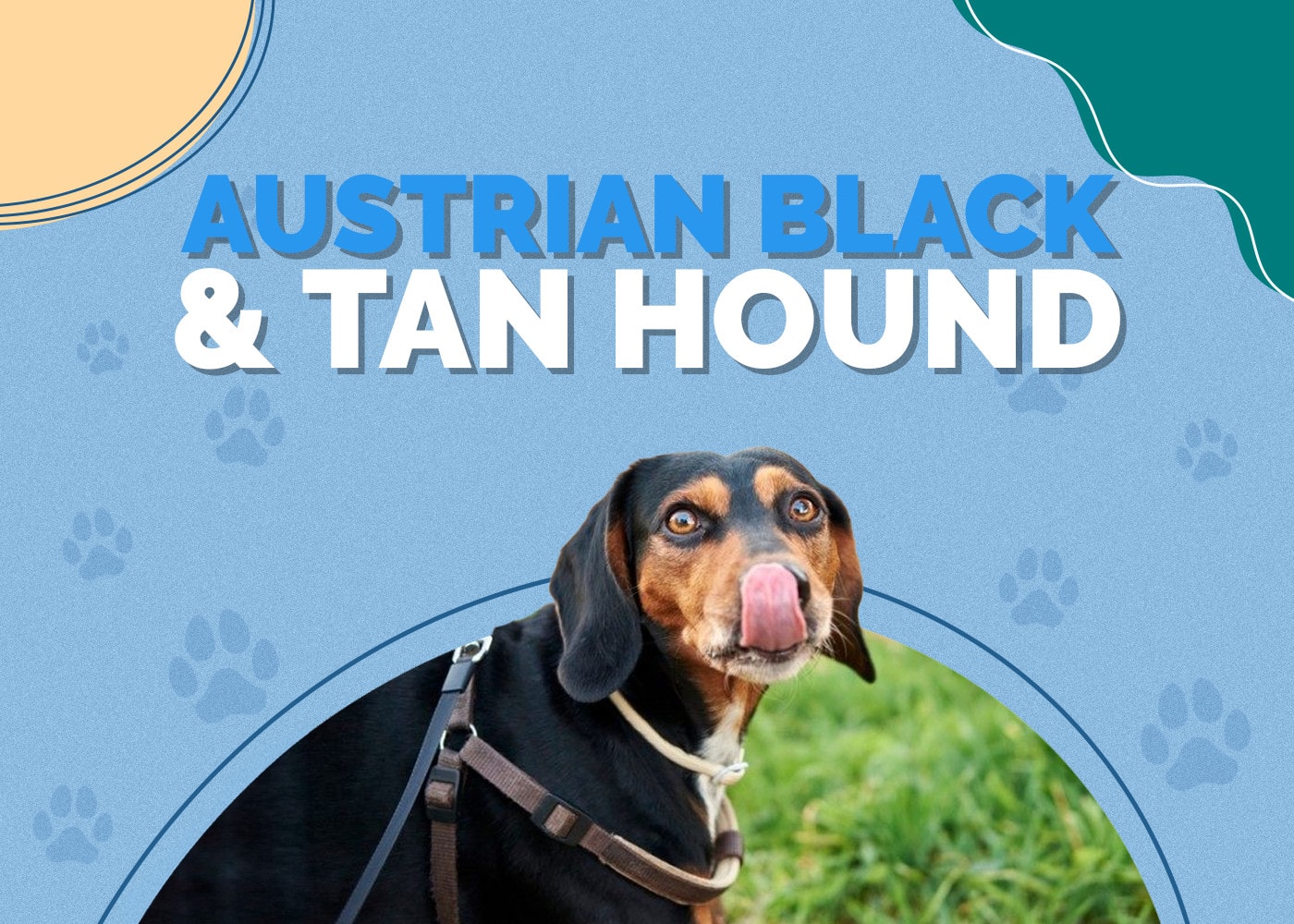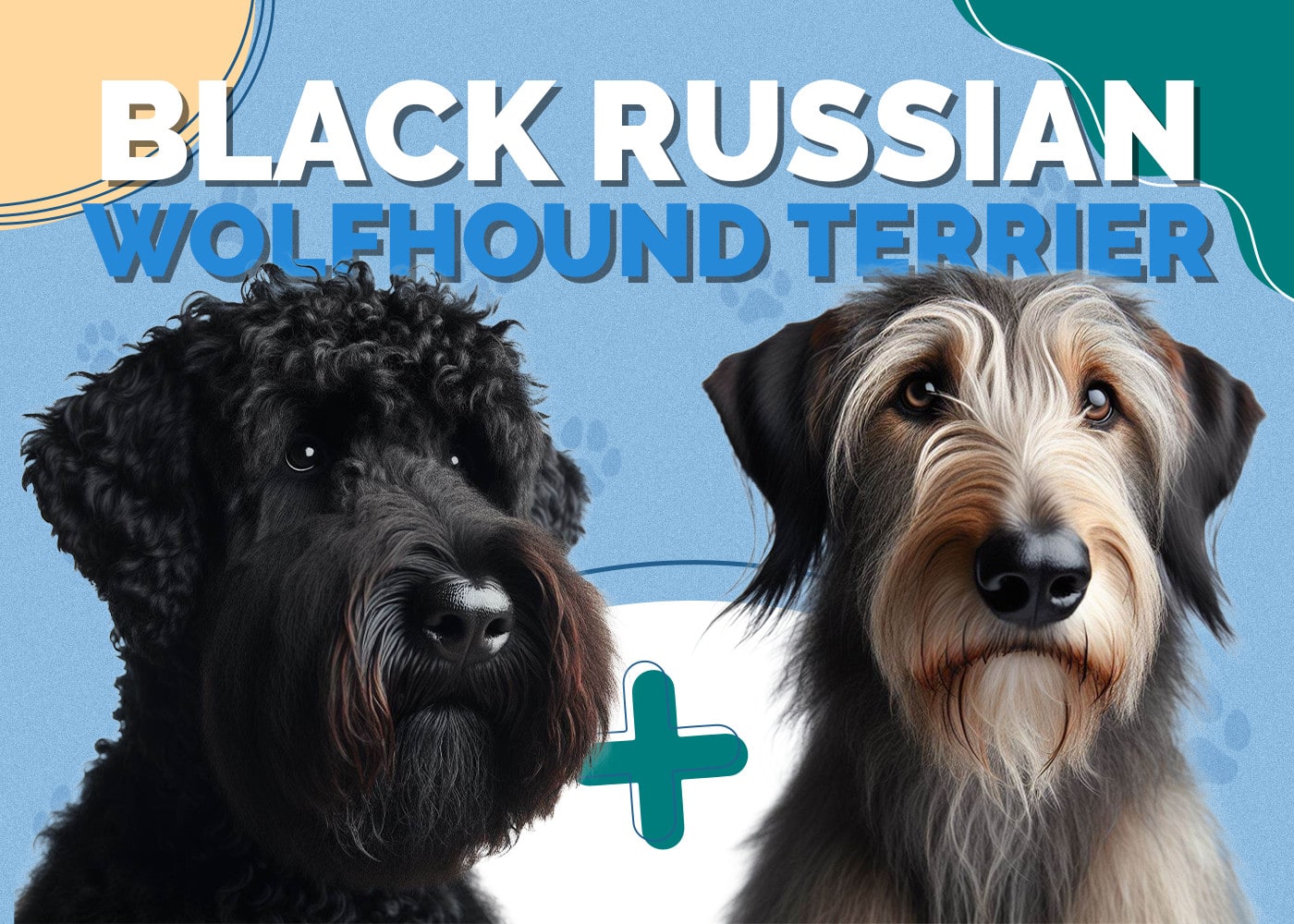Doxiepoo (Dachshund & Toy Poodle Mix): Info, Pictures, & Traits

Updated on
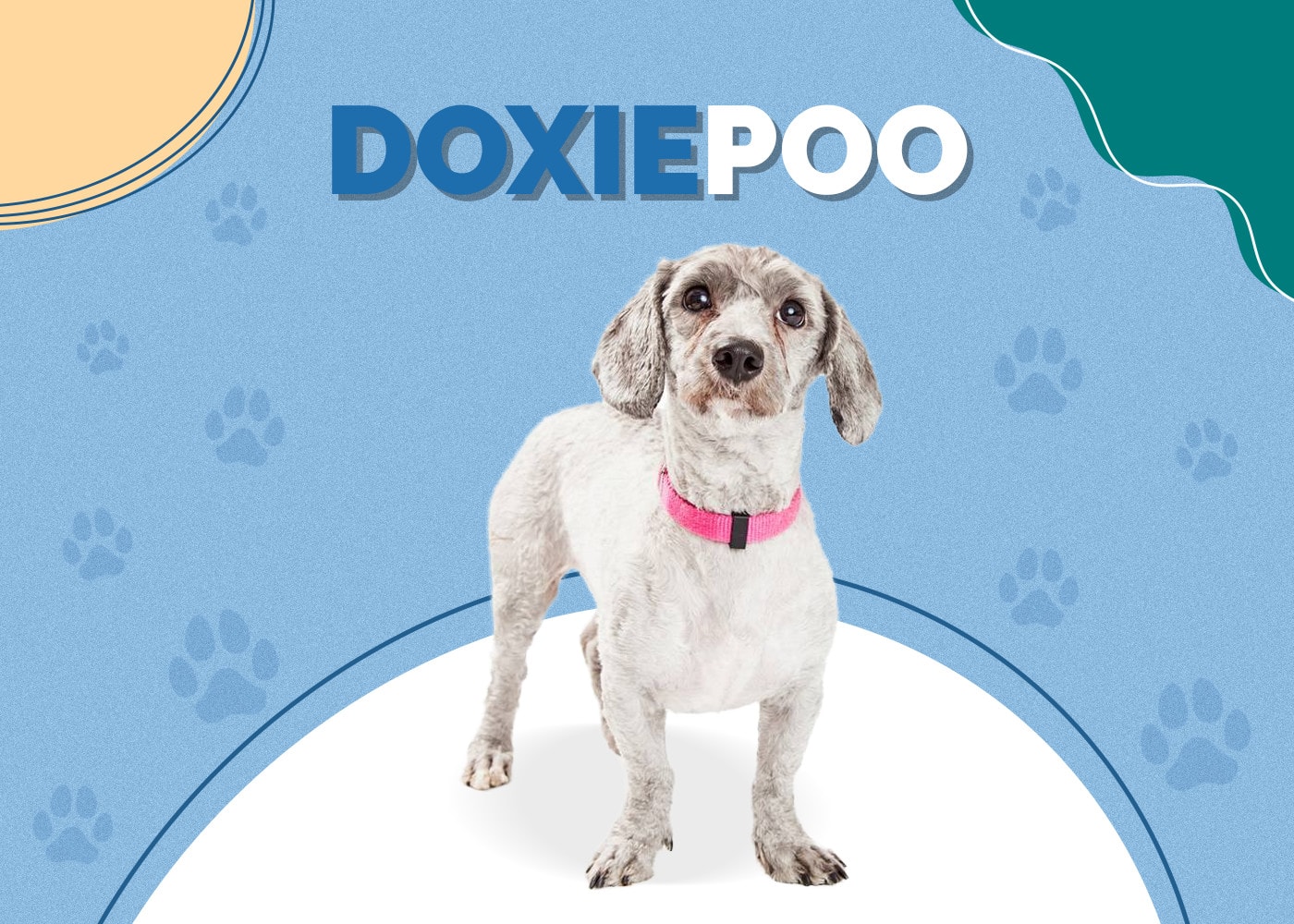
| Height: | 10 – 23 inches |
| Weight: | 10 – 30 pounds |
| Lifespan: | 10 – 15 years |
| Colors: | Black, white, brown, cream, grey |
| Suitable for: | Active families, singles, owners with limited space |
| Temperament: | Affectionate, curious, sensitive, shy |
The Doxiepoo, also known as a Doxiedoodle, is a hybrid breed that originated in the U.S.A. as a cross between a Dachshund and Toy Poodle. They are usually a small to medium-sized dog that can vary widely in appearance, depending on the dominant parent breed. They are a fairly new breed, first appearing in the early 2000s, so not much is documented around their origins. A brief amount of background information on their parent breeds will help you get to understand them better.
Poodles are an ancient breed, originating more than 400 years ago as duck hunting dogs. The Poodle has an undeserving reputation as a pampered lap dog, a stereotype that couldn’t be further from the truth. These dogs may be well-known for their fancy haircuts and expensive jewelry, but they are also strong, highly athletic working dogs and are among the best hunting dogs on the planet.
Dachshund, more commonly known as the sausage dog, are scenting hound dogs originally bred to hunt foxes, rabbits, and other small mammals. Their name is of German origin and translates to “Badger dog,” but they are commonly kept today as loyal and high-energy companions.
If you’d like to find out more about this unique Dachshund Poodle mix, the guide below will tell you everything you need to know about the high-spirited Doxiepoo.
Doxiepoo Puppies
The Doxiepoo is a fairly new breed of dog, so puppies can be difficult to find. As always, we recommend that you find a reputable breeder with a history of breeding healthy animals.
These puppies have dark, expressive eyes that can easily convince you to take one home. They have the soft and shaggy coat of their poodle parent, and their body is usually short and stocky, inheriting more Dachshund than Poodle. They are high-energy little pooches with strong prey drives, as both the parent breeds were used for hunting. This abundant energy should be a strong consideration if you are thinking about bringing a Doxiepoo home, as they require a great deal of exercise.
3 Little-Known Facts About the Doxiepoo
1. Doxiepoos love to bark.
Dachshunds are naturally prone to barking, and unlike some other small breeds, they have a loud and large voice. They are known to bark at almost anything, and it can be almost impossible to stop them once they get started. Proper training will help reduce this propensity for incessant barking, but it is unlikely to halt it.
Toy Poodles are also prone to frequent barking; however, they can be easily trained to reduce this habit, especially if started early. Thus, your Doxiepoo is likely to be an incessant barker, unless you get them into obedience training as soon as possible.
2. Doxiepoos are notoriously difficult to potty train.
Even though they are a highly intelligent breed, Doxiepoos are well-known for being a huge challenge to house train. This trait comes mostly from their Dachshund heritage. Any Dachshund owner will tell you how difficult it is to get these dogs potty trained, with many owners never succeeding. The best bet is to start them early as possible, as it is their stubborn streak that prevents them from learning this essential activity, so they are more likely to take to it as puppies.
3. They come in sizes to suit any owner.
Standard Poodles are fairly large dogs, but they also come in three other sizes that were selected from breeding smaller and smaller Poodles. They also come in medium, miniature, and toy sizes, and although the Doxiepoo is a Toy Poodle cross, these size variations can still crop up in the genetics.
Dachshunds come in two different sizes, standard and miniature, so when crossing with a Poodle, you never quite know what size you’ll get in a Doxie.
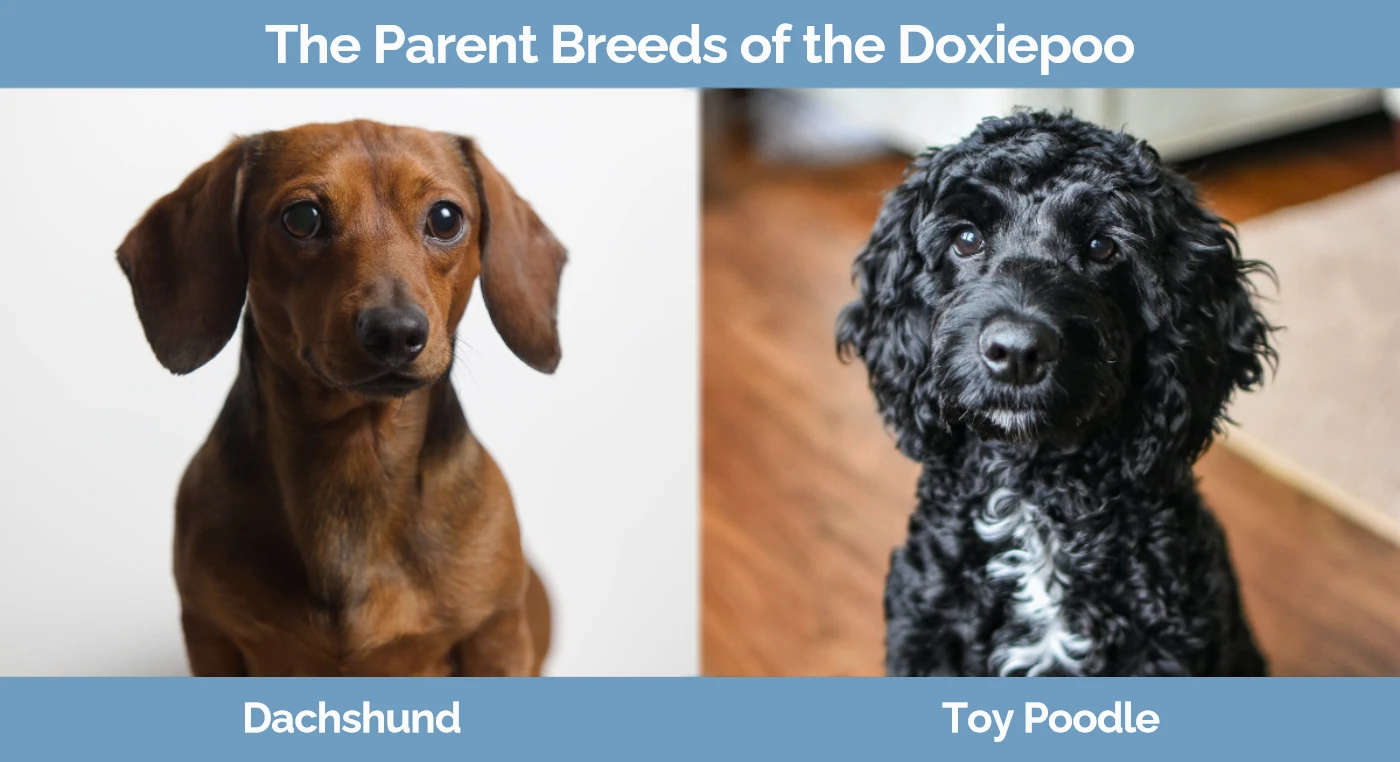
Temperament & Intelligence of the Doxiepoo 🧠
The Doxiepoo is an intelligent animal, inheriting their smarts from their Poodle lineage. Dachshunds are clever dogs too, and the combination of these two smart pooches ensures a highly intelligent breed. They are generally friendly and lively dogs that love to be around their owners but are also content to go sniffing around in the yard after a rogue scent.
They can be shy around strangers but warm up quickly and will soon be cuddled in their lap. Both the parent breeds of these dogs have a stubborn streak, and this can be a challenge when it comes to obedience. You’ll need to let your Doxiepoo know early on that you are the one in charge, as they can quickly assume the leadership role. These dogs need a great deal of mental stimulation due to their high intelligence, and without it, they will quickly become bored. This boredom will inevitably lead to behavioral problems and possibly even aggression.
In general, they are loving and affectionate dogs that are eager to please and love nothing more than playing, running, and dozing with their owners. They are also a high-energy breed that doesn’t like to be left alone. If you are not an active person or are away from home frequently, you’ll need to reconsider whether the Doxie is the right choice of dog for you.
Are These Dogs Good for Families? 🏡
Doxiepoos love being around people and consequently, make great family pets. Their small size and big personalities make them perfect playmates for children with almost inexhaustible reserves of energy. Although they are a bit shy and wary of strangers, they won’t take long to join the fun.
Does This Breed Get Along With Other Pets? 🐶 😽
Doxiepoos will generally get along great with other dogs and pets, provided that they are socialized at a young age. They have a big personality that will often cause them to boss other dogs around, but all in the name of fun. One issue is that Doxiepoos have a deep hunting heritage with a powerful prey drive, which may cause them to go after small family pets. With the correct training and socialization, this can be largely mitigated, though.
 Things to Know When Owning a Doxiepoo
Things to Know When Owning a Doxiepoo
Food & Diet Requirements 🦴
Doxiepoos don’t have massive dietary requirements, and depending on their size, they will need around 1 or 2 cups of dry food a day. You’ll want to give them the best quality dry kibble that you can find and ideally supplement this dry food with lean meat or canned food on occasion.
These dogs are prone to getting overweight and can be greedy at times. They should not be freely fed, as this will quickly lead to obesity.
Exercise 🐕
We recommend a minimum of 60 minutes a day of physical and mental exercise. Regular exercise is essential for all dogs, but due to the high intellect and relatively high energy of Doxiepoos, it is all the more important. These dogs have a tendency for misbehavior if they don’t get the required stimulation, including chewing, and of course, excessive barking.
We recommend breaking exercise up into two shorter chunks and concentrate one session on more mentally simulating exercise, such as frisbee or fetch, and one session dedicated to straight exercise, like a brisk walk or jog. Poodles have a long history working in water, so Doxies will likely love the occasional swim.
Training 🦮
Toy Poodles are highly intelligent dogs and are easily trained. While Dachshunds are also intelligent animals, they have a stubborn streak that can make training them a challenge, and this is often seen with Doxiepoos too. This why we recommend getting started with training as early as possible before they can build up any stubborn habits. Positive reinforcement training is ideal for Doxiepoos, as they are sensitive and gentle dogs that will wallow in the attention. This type of training rewards dogs when they exhibit good behavior, and your Doxie will lap up the praise.
Due to the stubborn nature that they can sometimes exhibit, Doxiepoos will require a great deal of dedication and patience during training. But with consistent and dedicated training sessions, they will usually love the process and be obeying commands in no time!
Grooming ✂️
Doxiepoos are low-maintenance pooches that don’t require a large amount of grooming. They are low-shedders and ideal for owners with allergies, as they are hypoallergenic. That said, some of these dogs do have thick, short to medium-length coats that will require at least a weekly brushing. Depending on whether your Doxiepoo has more Poodle traits, they may even need daily brushing to prevent matting.
Regular ear checks are essential, as the Doxiepoo’s floppy ears have reduced airflow inside of the canal and are thus prone to infection. Other than that, the occasional nail clipping if needed, and a good tooth brushing once or twice a week are all that’s required.
- Also see: Best Dog Shampoos – Reviews & Top Picks
Health Conditions ❤️
While these dogs are generally a healthy breed without many issues, they can inherit the common issues that their purebred parent breeds can suffer from.
The Dachshund’s long bodies make them prone to intervertebral disc disease, which is a musculoskeletal disease which causes the spinal vertebrae to weaken. In mixed breeds like the Doxiepoo, it is usually mild and can be treated with anti-inflammatory medication, but the more severe case will often require surgery.
Their short legs and long body can occasionally cause patella luxation, which is a condition in which your dog’s kneecap continuously pops out of its groove. This condition is rarer in crossbreeds and can be largely mitigated with regular exercise and not overfeeding your pooch.
Some other conditions include eye issues like cataracts and progressive retinal atrophy, but these are usually diseases of old age.
- Bloat
- Cataracts
- Ear infections
- Skin infections
- Cancer
- Intervertebral disc disease
- Hip dysplasia
- Patella luxation
- Progressive retinal atrophy
Male vs Female
If you are sold on the idea of owning your very own Doxiepoo in the near future, the last question you’ll need to answer is whether a male or female is the right choice for you. The first thing you need to remember is that all dogs, no matter male or female, are individuals that will have their unique traits that differ from the standard generalizations. That said, there are a few small common differences in male and female Doxiepoos.
Male Dachshunds are known to be more affectionate than females, and the same usually goes for Doxiepoos. Females tend to be more reserved and independent, especially as they get older, whereas males will stay attention-seeking and playful well into old age. Females mature earlier and can begin training earlier than males, and they are more likely to stay attentive and be less distracted during training sessions.
With all this in mind, there is no real superior sex or convincing reason to have one over the other. Getting a female spayed as soon as possible and male neutered as soon as possible will negate almost all differences and lead to an all-round healthier and happier pooch.
Final Thoughts on the Doxiepoo
The small-in-size but large-in-character Doxiepoo is a dog that is sure to quickly win your and your family’s hearts. They are playful pooches that have just enough energy to keep up with you on a morning jog and enough of a calm and gentle temperament to cuddle on the sofa too. They are great little dogs to have around kids, and their high intellect will make them great playful companions that are easy to train.
Although they are small, apartment dwellers, beware: these dogs are infamous for their love of barking and will likely continue the habit even after loads of training. This does make them nifty pint-sized little guard dog, though.
For owners who are fairly active and don’t have space for larger dogs, the Doxiepoo will make an ideal little companion.
Featured Image Credit: Susan Schmitz, Shutterstock


 Things to Know When Owning a Doxiepoo
Things to Know When Owning a Doxiepoo
